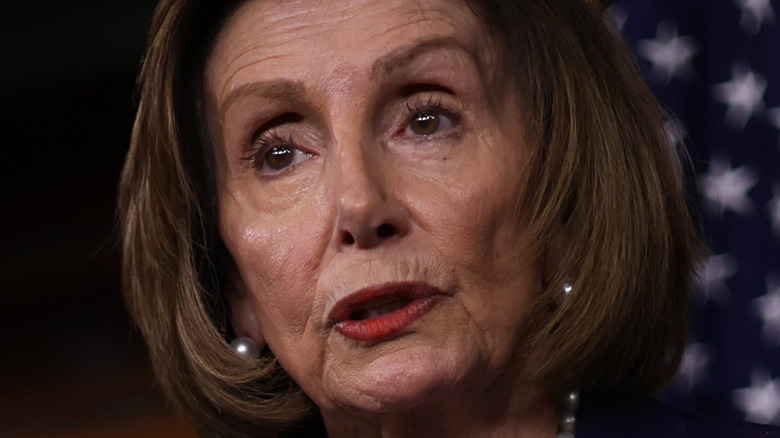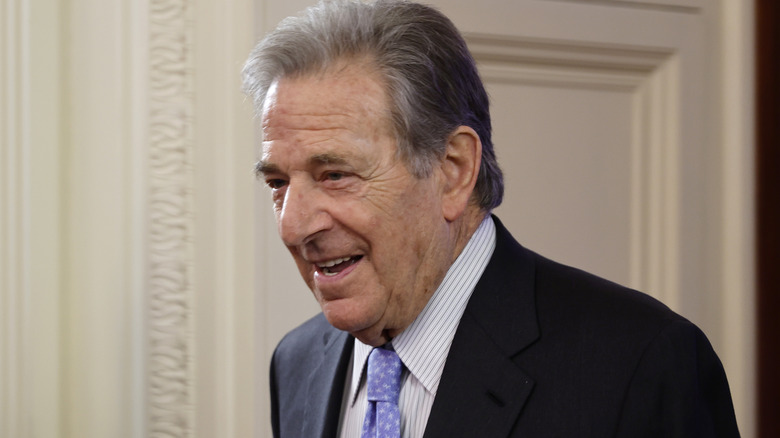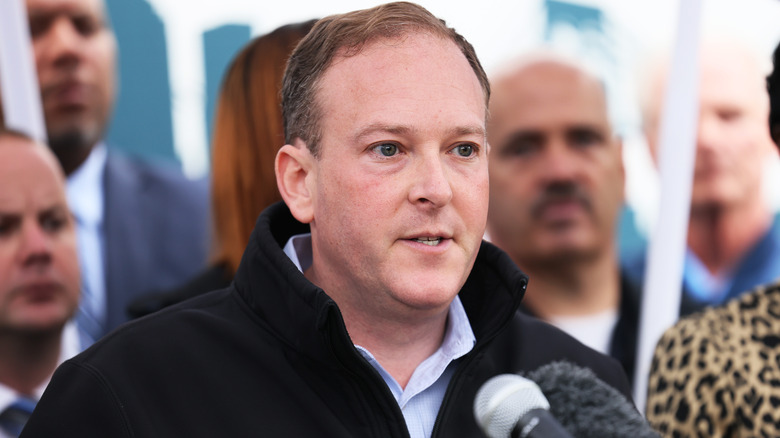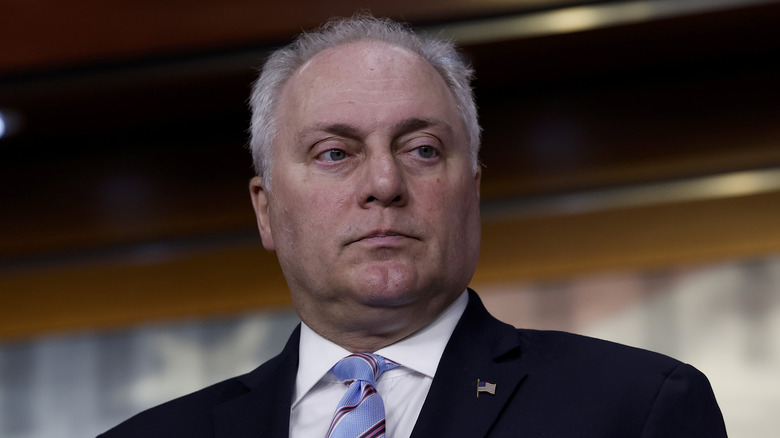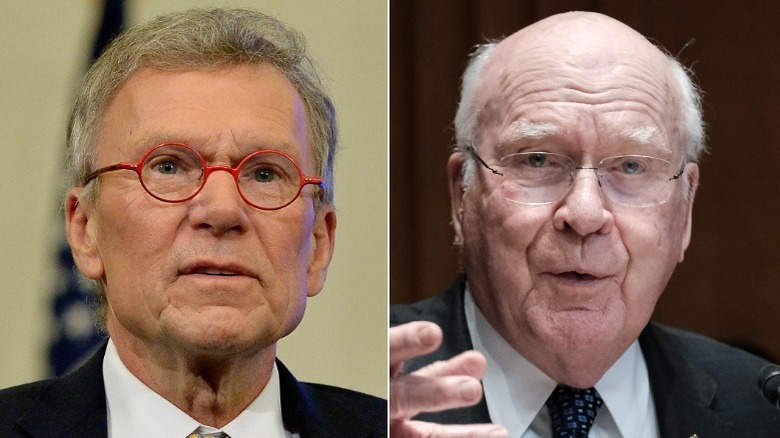Politicans And Family Members Who've Been Violently Attacked
If nothing else, the January 6 attacks taught us that political tensions in the United States have risen to new levels. As the divide between the left and the right grows, folks have become less willing to talk about their politics publicly. According to a study done by the PEW Research Center, almost 50% of Americans report that they no longer discuss politics with those close to them simply because they hold differing beliefs. This degradation of civil discourse is undeniably a bad thing — it's made it easy to paint those with opposing views as villains rather than other human beings still deserving of basic human rights and respect. And what do movies, TV shows, and books tell us we should do with villains? Eliminate them.
This shift is largely to blame for the uptick in political violence we've seen in recent years. Here at Nicki Swift, we strongly believe violence against others — regardless of their political stance — is wrong. Voting, not our fists, is our best weapon when it comes to making a difference. And lest you think political violence is just a Republican issue or a Democrat problem, it's not. Both parties are guilty of physically attacking one another.
Below, we've highlighted six politicians and political family members who have been attacked in recent years. These folks, and their attackers, have been members of both parties. We hope that their tragic stories are the reminder we all need that violence is never the answer when it comes to solving our political differences.
Paul Pelosi
In the early morning hours of October 28, 2022, an intruder broke through a glass door at the Pelosi family home and told a shocked Paul Pelosi (who'd been rudely awakened from sleep) that he was there to see Nancy Pelosi. According to court documents obtained by The New York Times, the suspect went on to lay out his alleged plan for the stunned Paul — he was going to hold Nancy Pelosi, the Speaker of the House, hostage, ask her some questions, and then break her kneecaps in order to teach her a lesson about supposedly lying to the American people. Paul informed the man that his wife wasn't home and then promptly called 911. Enraged by this turn of events, the man allegedly attacked Paul with a hammer, hitting him once in the head and rendering him unconscious.
The 82-year-old suffered a fractured skull, which required surgery to repair, and wound up spending six days in the hospital. Pelosi's attacker, David DePape, told responding police officers he was on a suicide mission and that he had a list of other politicians he intended to attack before he died. He has since been charged on a state level with attempted murder, burglary, and elder abuse, and on a federal level with assault of a relative of a federal official and attempted kidnapping of a federal official. DePape has pled not guilty on all charges but could face 13 years to life in prison if he is convicted.
Lee Zeldin
Just months before Paul Pelosi was violently assaulted, Lee Zeldin, a New York gubernatorial candidate, was attacked at a campaign event.
In July 2022, Zeldin was kicking off a four-day campaign tour in upstate New York. As he was giving his welcome speech, a man climbed on stage and allegedly attempted to stab the politician with a knife-like personal defense weapon he had concealed on his person. Thankfully, Zeldin was able to grab ahold of the man's wrist before he was injured, and members of his team and the audience promptly wrestled the alleged assailant to the ground. Despite the fact that he was likely quite shaken up by the incident, the congressman got right back up on stage and finished his remarks after the police had escorted the attacker out.
Zeldin's attacker, David G. Jakunbonis, was charged on a state level with second-degree assault and on a federal level with assaulting a member of Congress with a deadly weapon. Though his case has yet to go to trial, he could serve up to 10 years behind bars if he were to be convicted. There's plenty of video evidence of the attack, meaning it's unlikely Jakunbonis could plead not guilty, though it's possible, especially considering some of his previous remarks. According to Democrat & Chronicle, Jakunbonis told law enforcement officials he only assaulted Zeldin because he was drunk and blacked out, not because he knew he was a politician or because he objected to his views.
Steve Scalise
Five years before Paul Pelosi and Lee Zeldin were physically attacked, House Whip Steve Scalise was shot at baseball practice. Let's set the scene: in July 2017, just a few months after Donald Trump was elected to the presidency, Scalise, a prominent Republican leader, and several of his congressional colleagues, were hanging out at a baseball field in a Washington D.C. suburb. The politicians were practicing for the Congressional Baseball Game — an annual tradition that began in 1909 and is used as a fundraiser for several non-political D.C. charities — when a lone gunman began firing his rifle at those on the field. Scalise was hit once in the hip and suffered serious injuries to his internal organs that left him in critical condition and required several surgeries. A handful of other staffers were hit as well, though thankfully no one else had life-threatening injuries.
The gunman, James T. Hodgkinson, died at the scene following a shootout with police. In the years since the event, FBI agents determined that the attack was a suicide-by-cop event. However, many folks, including some who were at the scene, dispute this conclusion. Judging by things posted on his social media profiles, Hodgkinson was strongly anti-Trump and anti-conservative. This, combined with the fact that he sought out a conservative-only gathering and shot off 136 rounds, has led many to believe the assault was much more politically motivated than the FBI is willing to admit.
Gabby Giffords
Steve Scalise isn't the only politician to have been affected by gun violence. On a Saturday morning in 2011, Arizona representative Gabby Giffords was hosting a meeting with her constituents in the parking lot of a local grocery store when a gunman opened fire. Six people were killed, including a 9-year-old girl and a federal judge. The congresswoman, who is understood to have been the target of the attack, was shot in the head. Giffords was in critical condition as the bullet had passed through her brain, and underwent several surgeries as well as a long and difficult rehabilitation period.
The gunman, a 22-year-old named Jared Lee Loughner, had apparently been making ominous and threatening statements on the internet in the weeks leading up to the attack. It's clear that his opposing political views as well as the state's lax gun laws (they are among the most relaxed in the country) are what led to the shooting. He wound up pleading guilty to 19 charges and was sentenced to life in prison without the possibility of parole. Giffords, fortunately, had a full recovery. She is now one of the country's biggest advocates for gun safety and gun control laws, and her organization, Giffords, has been credited with making gun control a kitchen-table issue for voters.
Patrick Leahy & Tom Daschle
In the weeks following 9/11, the country was, understandably, on edge. Tensions were only heightened when letters containing anthrax were sent to locations like news agencies and politicians' offices around the country. Two of these known letters were mailed to the offices of Senators Patrick Leahy and Tom Daschle.
Daschle was the first to receive his letter, which was opened by an intern named Grant Leslie. According to her testimony, a white powder poured out of the envelope, covering her hands, clothes, and shoes. The building was immediately shut down, and everyone who came in contact with the powder was treated and vaccinated. Just a few days later, a similar letter, also full of anthrax, was intercepted on its way to Leahy's office. In the end, neither senator ever came in contact with the poison, though five people who had come in contact with the letters over the course of their journeys were killed and another 17 were injured.
To this day, there are still no answers as to who sent the letters and why. The FBI had a suspect at one point, Bruce E. Ivins, an infectious disease expert, but he died by suicide before an investigation could begin, leaving plenty of questions in his wake. In 2011, Senator Leahy said he remains convinced that Ivins, if involved, did not act alone and, as a result, considers the case not closed.
If you or anyone you know is having suicidal thoughts, please call the National Suicide Prevention Lifeline by dialing 988 or by calling 1-800-273-TALK (8255).

